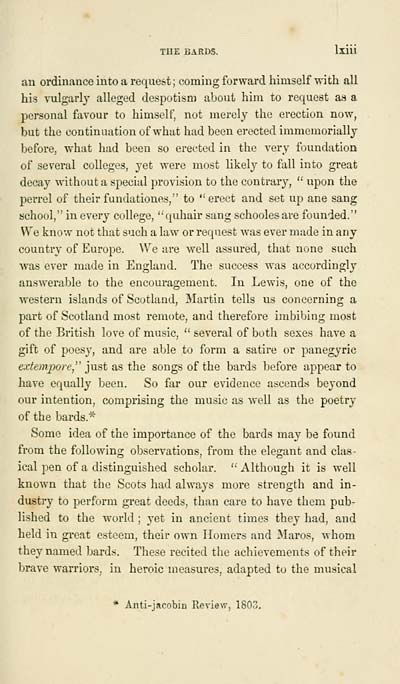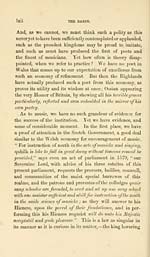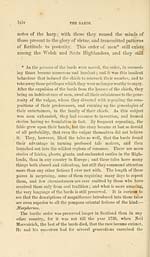Download files
Complete book:
Individual page:
Thumbnail gallery: Grid view | List view

THE BARDS. Ixiu
an ordinance into a request ; coming forward himself with all
his vulgarl}' alleged despotism about him to request as a
personal favour to himself, not merely the erection now,
but the continuation of what had been erected immemorially
before, what had been so erected in the very foundation
of several colleges, jet were most likely to fall into great
decay without a special provision to the contrary, " upon the
perrel of their fundationes," to "erect and set up ane sang
school," in every college, "quhair sang schoolesare founded."
We know not that such a law or request was ever made in any
country of Europe. We are well assured, that none such
was ever made in England. The success was accordingly
ansAverable to the encouragement. In Lewis, one of the
western islands of Scotland, Martin tells us concerning a
part of Scotland most remote, and therefore imbibing most
of the British love of music, " several of both sexes have a
gift of poesy, and are able to form a satire or panegyric
extempore," ^nst as the songs of the bards before appear to
have equally been. So far our evidence ascends beyond
our intention, cx)mprising the music as well as the poetry
of the bards."^
Some idea of the importance of the bards may be found
from the following observations, from the elegant and clas-
ical pen of a distinguished scholar. " Although it is well
known that the Scots had always more strength and in-
dustry to perform great deeds, than care to have them pub-
lished to the world ; yet in ancient times they had, and
held in great esteem, their own Homers and Maros, whom
they named bards. These recited the achievements of their
brave warriors^ in heroic measures, adapted to the musical
* Anti-jacobin Review, 1803.
an ordinance into a request ; coming forward himself with all
his vulgarl}' alleged despotism about him to request as a
personal favour to himself, not merely the erection now,
but the continuation of what had been erected immemorially
before, what had been so erected in the very foundation
of several colleges, jet were most likely to fall into great
decay without a special provision to the contrary, " upon the
perrel of their fundationes," to "erect and set up ane sang
school," in every college, "quhair sang schoolesare founded."
We know not that such a law or request was ever made in any
country of Europe. We are well assured, that none such
was ever made in England. The success was accordingly
ansAverable to the encouragement. In Lewis, one of the
western islands of Scotland, Martin tells us concerning a
part of Scotland most remote, and therefore imbibing most
of the British love of music, " several of both sexes have a
gift of poesy, and are able to form a satire or panegyric
extempore," ^nst as the songs of the bards before appear to
have equally been. So far our evidence ascends beyond
our intention, cx)mprising the music as well as the poetry
of the bards."^
Some idea of the importance of the bards may be found
from the following observations, from the elegant and clas-
ical pen of a distinguished scholar. " Although it is well
known that the Scots had always more strength and in-
dustry to perform great deeds, than care to have them pub-
lished to the world ; yet in ancient times they had, and
held in great esteem, their own Homers and Maros, whom
they named bards. These recited the achievements of their
brave warriors^ in heroic measures, adapted to the musical
* Anti-jacobin Review, 1803.
Set display mode to: Large image | Transcription
Images and transcriptions on this page, including medium image downloads, may be used under the Creative Commons Attribution 4.0 International Licence unless otherwise stated. ![]()
| Early Gaelic Book Collections > Ossian Collection > Ossian, his principal poems > (67) |
|---|
| Permanent URL | https://digital.nls.uk/82621705 |
|---|
| Description | Selected books from the Ossian Collection of 327 volumes, originally assembled by J. Norman Methven of Perth. Different editions and translations of James MacPherson's epic poem 'Ossian', some with a map of the 'Kingdom of Connor'. Also secondary material relating to Ossianic poetry and the Ossian controversy. |
|---|
| Description | Selected items from five 'Special and Named Printed Collections'. Includes books in Gaelic and other Celtic languages, works about the Gaels, their languages, literature, culture and history. |
|---|

